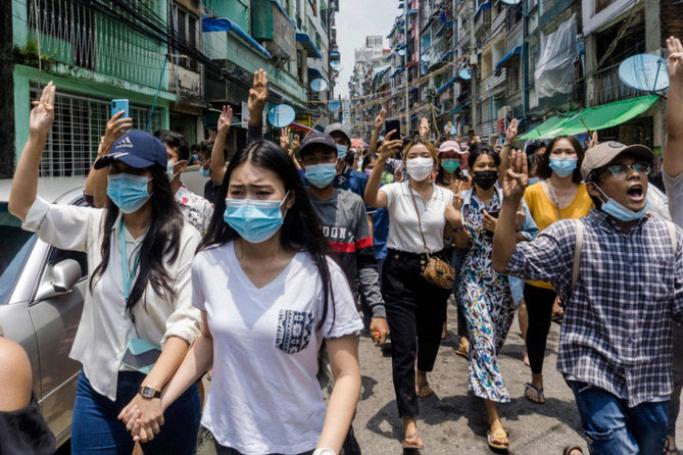Since the transition to the democratic government in Myanmar in 2015, the civilian government and civil society organizations have been advocating for gender equality and women's rights in order to eliminate gender-based violence and discrimination.
Although the movement for women's rights saw some progress, on 1 February 2021 people in Myanmar woke up to a military coup in which democratically elected leaders were illegitimately detained.
The military takeover upended the hopes and basic rights of the people. But the situation has been particularly bad for women, with them being arrested violently and tortured sexually by the military and security forces during the interrogation process.
Aung Myo Min, who is the National Unity Government (NUG) Minister of Human Rights, said that he received a lot of evidence and data of violence against women after the coup.
“During the previous NLD (National League for Democracy) government, I tried as much as I could to promote women's rights. So, I was able to try to implement a law to prevent gender-based violence against women. Following the military coup, the terrorist Military Council is violating all the said rules and laws. We have seen especially that the military is committing sexual abuse and exploitation against women who are being detained and interrogated. Furthermore, we have been informed that women in the countryside, instead of getting protection, are suffering more gender-based violence perpetrated by the military during the armed conflicts,” Aung Myo Min said.
Local news outlets reported that women and members of the LGBTQ community are sexually abused and exploited by the junta troops in the interrogation centres. The Military Council is particularly targeting women who are pro-democracy activists in order to arrest and torture them.
“The worst thing is after the coup, the military regime has unlawfully been bringing charges against and sentencing pro-democratic women activists with long years with harsh labour,” Aung Myo Min said. Just a few days ago, the Military Council arrested and charged an attorney Daw Yut Nu Aung, who was offering legal aid for the child rape case, known as the Victoria case, in Nay Pyi Taw, and assisting the legal defense of NLD vice-chairman named Dr. Zaw Myint Maung, under the terrorism act, which could result in a long prison sentence. She is being accused of supporting the People's Defence Forces (PDF).
The Myanmar military or Tatmadaw have been escaping from justice and punishment even though it has frequently been sexually abusing and committing gender-based violence against women in the ethnic minority regions and states for decades.
In spite of the fact that the NUG is attempting to prosecute the military regime in the international criminal court for criminal cases and gender-based violence against women perpetrated by the junta troops during the civil strife, no changes to the behaviour have been seen as yet.
Ma Thin Zar is one of those people who are courageously leading protests against the military dictators in order to be able to restore democracy in Myanmar despite the violent crackdowns on the protesters by the military troops in Yangon.
“We are not scared to die protesting on the roads. Young women like us are being sexually abused by the military troops, so we will be fighting in this revolution using different tactics to wipe out the military dogs (military troops) completely,” pro-democracy activist Ma Thin Zar said.
“We will continue to fight for the young women who were abused in interrogation centres, for the women who were raped in the area of armed conflicts,” she added.
On 18 April, Ma Khin Nyein Thu from Yankin Township who peacefully protested against the regime was reportedly beaten to a pulp by Military Council troops at the Shwe Pyi Tar interrogation centre. In addition, her relatives told local media that she was also sexually abused there.
According to a report by the Assistance Association for Political Prisoners (AAPP), there have now been 13,452 pro-democracy activists, imprisoned by the Military Council. More than half of these detained are women and half of the 1,800 people killed by the military were also women.
After the military ousted the civilian government, there are no longer guarantees for women to live safely, and the living conditions for women are getting worse.
In Myanmar, the guarantee of safety for women depends on the success of the current Spring Revolution. Most women have been resisting and fighting against the military because they firmly believe that they will be set free from the violence and abuses of the military.
Despite having difficulties to provide guarantees and protections for women in Myanmar at present, the NUG, which is playing an important role in the Spring Revolution, is promising plans to implement new safeguards for women rights that will fully be enacted after the revolutionary period.
Many people including women view the Spring Revolution as a crucial turning point for Myanmar – and for women’s rights.
Getting rid of military rule is make or break. There is no turning back.












